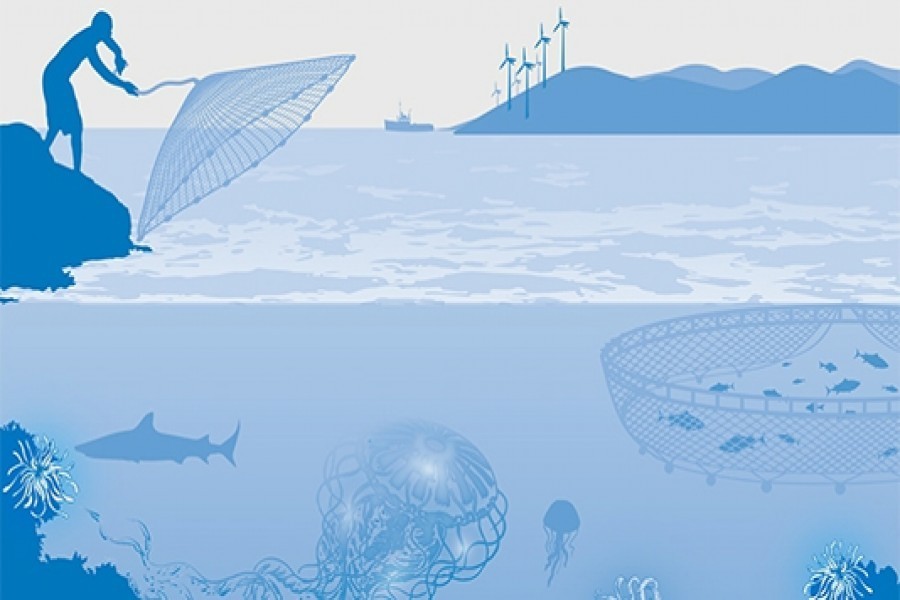
Published :
Updated :

With the historic victory over India and Myanmar in the maritime dispute, Bangladesh acquired sovereign and rightful claim over the 118,813 square kms of the territorial sea, 200 nautical miles of an exclusive economic zone in the Bay of Bengal, and all the oceanic resources up to 354 nautical miles from the Chottogram coast, back in 2014. This legal win gave a boost to the discussion around the exploration of the blue economy in the coastal areas of Bangladesh as newer trade opportunities were open to being cultivated along with the traditional economic activities.
Yet, nearly after the lapse of a decade, Bangladesh has not been able to dig into the emerging sectors relevant to the ocean economy and mobilise the resources of coastal areas. According to the Ministry of Fisheries and Livestock, in the fiscal year 2014-15, Bangladesh received a gross value addition (GVA) of US $6.2 billion from the contribution of the ocean economy with tourism being the highest contributor (one-fourth of the total value). Another indication of how the ecosystem could not hone the opportunities of the ocean economy is the data dearth of this sector in both the public and private domains.
The government, however, has set the blue economy sector as a priority and identified 26 maritime economic functions under six broad categories based on the available resources in the country.
While blue economy emphasises efficient utilisation of coastal resources, such as conservation and sustainable uses of ocean resources, extraction of natural gas and oil, and usage of sustainable energy and marine resources for economic growth, majority of these require heavy investment, large conglomerate/enterprise engagement, policy advocacy etc. This also entails the involvement of multiple public and private agencies, an extended amount of waiting period for decision-making and relevant development, and additional bureaucratic processes eventually slowing down the expected ecosystem changes.
The necessity of promoting SME businesses and innovative startups with the right assistance comes here. SME businesses can rapidly disrupt the existing ecosystem with the appropriate product and solution and create a positive impact on the larger businesses as a ripple effect. With the promotion of the local businesses and startups serving under the umbrella of an ocean-based economy, three key impacts are expected to transpire: accelerated economic growth in the targeted sectors, improved livelihood of local communities due to the creation of employment, and sustainable coastal development solutions.
In Bangladesh, due to the fragmented nature of the ocean-based SME products and solutions, the sustainability of such businesses is a major challenge in giving momentum to the blue economy activities in the coastal belt. Introducing startup incubators and accelerators is a potential solution to make these businesses profitable and provide support in market linkage, access to finance, and an efficient value chain. Through introducing such platforms, four key limitations can be solved or alleviated within a shortened span of time:
First, the innovative solutions or products that are facing obstacles in flourishing due to lack of investment can receive support for grant applications, idea submission, pitching ideas to global investors, and cater to greater investment opportunities other than traditional financial institutions. For example, seaweed and oyster cultivation are two high-growth potential products that have been limited due to a lack of funding in the Cox's Bazar region.
Second, ideas with innovative technological solutions can be connected with the right stakeholders and introduced to the market. While tech-based aquaculture and marine solutions are being embedded in trades in countries like Indonesia, Singapore, Thailand etc., Bangladesh can boost such inclusion into the traditional trades of coastal areas (for example-- by introducing e-commerce to boost local businesses, and use of IoT solutions for fisheries and marine culture).
Third, an opportunity of building a strong community of SMEs, intermediaries, investors, technology support providers, mentors, and other stakeholders relevant to the blue economy development should be opened. This is crucial to bring the fragmented businesses and services under an umbrella and create the desired ecosystem.
Finally, the task of policy advocacy and infrastructure development can be shaped as an incubator/accelerator programme for arranging policy dialogues and stakeholder engagement, bringing all relevant public and private agencies together.
A successful example of such an incubation network is the startup hub launched in Indonesia, Digifish Network, which has changed the entire sea-based startup ecosystem in the country. According to the FAO data, Indonesia is the second largest producer of marine capture in the world. With the geographic advantages of cultivating fisheries and other aquaculture resources, Indonesia has become one of the home grounds for innovative aquatic startups. Digifish Network, a startup hub for integrated aquaculture business and information networks, was established in 2018 to become a facilitating ecosystem for aquaculture startups in Indonesia. At present 30 startups are part of this network who receive support for access to finance and efficient supply chain. According to a report by CNBC, startups connected with this hub have already received investment from renowned investment firms. In May 2023, eFishery, one of the pioneers in building the hub, was announced to be the first unicorn aquaculture startup in the world after raising $108 million in Series D funding.
In Bangladesh, a number of ocean-based startups have been working with seaweed, oysters, mussels etc to prepare processed food, healthcare and cosmetics products.
Bangladesh needs to take the successful strategic approaches implemented by the coastal economies such as Indonesia and Singapore into consideration and introduce the launch-pad platform for local marine businesses. Amidst the economic struggles awaiting the global economy, activating the ocean economy can boost internal trade and businesses with better cash flow in return.
jannat.e@inspira-bd.com


 For all latest news, follow The Financial Express Google News channel.
For all latest news, follow The Financial Express Google News channel.